- Home
- Jennifer A. Nielsen
Words on Fire
Words on Fire Read online
Contents
Title Page
Dedication
Epigraph
Chapter One
Chapter Two
Chapter Three
Chapter Four
Chapter Five
Chapter Six
Chapter Seven
Chapter Eight
Chapter Nine
Chapter Ten
Chapter Eleven
Chapter Twelve
Chapter Thirteen
Chapter Fourteen
Chapter Fifteen
Chapter Sixteen
Chapter Seventeen
Chapter Eighteen
Chapter Nineteen
Chapter Twenty
Chapter Twenty-One
Chapter Twenty-Two
Chapter Twenty-Three
Chapter Twenty-Four
Chapter Twenty-Five
Chapter Twenty-Six
Chapter Twenty-Seven
Chapter Twenty-Eight
Chapter Twenty-Nine
Chapter Thirty
Chapter Thirty-One
Chapter Thirty-Two
Chapter Thirty-Three
Chapter Thirty-Four
Chapter Thirty-Five
Chapter Thirty-Six
Chapter Thirty-Seven
Chapter Thirty-Eight
Chapter Thirty-Nine
Chapter Forty
Chapter Forty-One
Chapter Forty-Two
Epilogue
Epigraph
Sneak Peek at Resistance
Acknowledgments
About the Author
Also by Jennifer A. Nielsen
Copyright
To be without learning is to
be without eyes.
—Lithuanian proverb
My name is Audra.
In my language, Lithuanian, it means storm.
But my language had become illegal. If the soldiers we passed on the roads heard us speaking it, we could be whipped on the spot or arrested. Or in some cases, we might disappear. That happened sometimes.
So I avoided saying my name in public, but I often wondered: If my language was forbidden, then my name was forbidden. Which meant I had no name.
Which left me perfectly free to do everything I could to defy the Russian occupiers.
I redoubled my grip on the sacks slung over my shoulder, braced myself against the wind coming at me, and continued down the path.
I’d come this far. No matter what was ahead, I could not stop now.
I would not stop now.
Too many lives depended on me. Starting with those of my parents.
June 1893
My father was made of magic.
Not real magic, of course—I knew magic wasn’t real—but if it ever might have been, then it was inside my father’s quick hands and lively voice. He was born with tricks and effects and a talent to share them with others, delighting audiences wherever he traveled.
How I wished I could be more like him, bold and adventurous, always ready with a joke or a story. Instead, I was the girl who ducked into the shadows when we had visitors, the girl who watched life from afar but rarely participated. The girl who wanted to be more than she was but knew such a thing would be the kind of magic even my father couldn’t achieve.
Mama’s magic was different. Since Papa’s work took him away so often, she found ways to fill our home with the smells of fried sweet bread, with the music she sang as we worked the garden, and with her tender good-night kisses on my cheek.
Those times were special, but nothing replaced the moments when we were all together. I loved to sit at Papa’s feet by the fire, watching him prepare for his shows, letting him test his tricks on me to see if I could guess the secrets. By now, I could, of course—I’d seen every trick a hundred times and could do many of them myself, but never in public, never like him.
“You can be like him in other ways,” Mama often said on the nights Papa was gone. “Be happy like him, be smart like him. But do not travel like him, that’s not for you.”
I had no wish for that either. Lithuania was a dangerous place to live. My parents had often explained that as their reason for keeping me on our little farm.
Our country was occupied by Cossack soldiers from Russia, the empire that claimed Lithuania as its own. Lithuanians disagreed, of course, but we were a small country of farmers and simple peasant folk. What were we supposed to do against such a vast empire?
“We’re supposed to keep our heads down and obey their laws,” Mama said whenever my father broached the question; then she’d steal a glance at me. “For Audra’s sake.”
“All of this is for Audra’s sake” was always Papa’s answer.
Those conversations continued late into the night, long after they thought I was asleep, and those were the moments when I realized that something about my father’s work had begun to make Mama nervous.
“Has this gone too far?” she’d whisper. “Have we risked too much?”
It wasn’t the first time she’d asked that question, but lately, Papa was taking longer to answer.
On this night, he finally replied, “Everything is fine, my love. This work is more important now than ever.”
Then his work wasn’t magic shows, not really. My father must have been involved in something more serious when he traveled, something that made Mama anxious.
Then she offered another question. “Do you think Audra suspects something?”
If I did, then that was all I had, a suspicion of something. And Papa’s assurance that I didn’t know what they were doing began to feel like an itch I couldn’t scratch. I needed answers.
To get them, I began secretly listening in on their conversations, becoming so good at it that I could sneak up close enough to touch them and they wouldn’t realize I was there. One scrap of information at a time, I began to understand that something in my father’s travels was illegal and dangerous, and that Mama feared one day he would make a mistake and we’d all be in trouble. Every discussion they had ended in the same way—with their agreement to keep me out of their business.
That is, until the summer after I turned twelve. On the evening of the summer solstice, Papa said to my mother, “Audra should come with me tonight.”
I immediately sat upright, wondering what might have made him suggest such a thing. He was seated in his chair at the table and had been reviewing a card trick for tonight’s performance. Laid out on the table was his brown leather shoulder bag, the one in which he carried most of his tricks. At his side was a tall canvas sack containing extra clothes and provisions for his travels from one village to the next. He wore that on his back and rarely traveled with anything more.
“Did you hear me, Lina?” Papa asked, giving me a wink as he did. “Audra should come—”
Mama didn’t even look at him to answer, “You’re going on to other villages after the show. Audra won’t know how to get back home.” Mama was stirring a stew for the night, making extra for Papa to take with him. Her voice was usually soft and gentle, but I heard the warning in her tone tonight. There was no chance of me going.
But he wasn’t giving up. “We’ll stay in our own village square, and there will be festivities all around. She won’t be in any danger tonight.”
“How do you know that, Henri? People have disappeared from our village. We both know why!”
“Audra is still young—”
“Will the soldiers care about that?”
My father set his cards down. “She must learn to see our world the way it is.”
“The way our world is, Audra is safer here.”
“Ignoring danger does not protect us from danger. Let me teach her.” His voice lowered almost to a whisper. “I’ve been giving this a lot of thought. She’s better off if she knows.”
Mama crossed the room to face him directly, standing at my side. “Henri, we have an agreement.”
By then, I was sitting up even taller, trying to figure out what they were talking about. “What is the agreement? Mama, I want to know.”
Mama folded her arms. “You don’t understand what you are asking.”
I lowered my eyes, considering her words, while Papa said, “But we do. We cannot refuse to teach her any longer. We agreed to do everything we could—”
“But no more than that. Nothing that puts Audra in danger.” She glanced at my father’s canvas sack. “Is everything packed and ready?”
“Yes, including the most important part.”
My curiosity sparked. “Can you show it to me, Papa?”
He opened his mouth to answer, but Mama took his hand instead. “Help me carry in the milk,” she said, pulling him outside. Which meant they intended to finish talking where I couldn’t hear.
I hated when they did that, when they made it obvious how little they trusted me with their most serious conversations. If they couldn’t trust me, then I figured there was no need to be trustworthy.
Papa was carrying something away from here in secret. I had to find out what it was.
As soon as the back door swung shut, I tried to lift his bag, but it was so heavy, I could barely make it budge. I unbuttoned the top and wondered why. Nothing I saw should have made it so heavy. There were only clothes and blankets and a few tin pans for cooking. What was beneath all of it?
I started to dig deeper into the bag, but everything was stuffed in tight, making it difficult to maneuver around. I wanted to get to the bottom of the bag, but my parents’ voices were getting louder, coming cl
oser.
I had just buttoned up the top when Mama walked into the house, picked up her spoon, and began stirring the pot of stew again. After a long sigh, she said, “I suppose the midsummer festivities only come once a year. If I go, too, then Audra and I can return home together.”
From where he stood in the doorway, Papa’s eyes twinkled—they often did. It was one of the ways I knew magic was inside him. I wanted my eyes to sparkle just as bright.
And Mama tried her best to smile, though all I saw in her eyes was worry, a glimmer of sadness I noticed more and more often, especially when Papa was away for his shows. And last winter, he’d been gone quite a bit, though he’d left his bag of magic tricks behind. On those trips, she did more than worry. Sometimes I heard her cry in the nights, long after she thought I was asleep.
Rubbing his hands together, Papa returned to the table and faced me. “Even with your mother there, you must follow our rules.”
My heart leapt with excitement. Whatever the rules, whatever the conditions, I intended to agree to them all. Anything so that I could go.
“I know the rules,” I said. “Avoid the Cossack—”
“There is one policeman in particular you must avoid. His name is Officer Rusakov and he is new to this district. He must have something to prove to his superiors, for he is strict with the law, all laws. We speak Lithuanian here at home, but out there tonight, it must be Russian, even if you believe you are surrounded by friends. Rusakov has spies, informants.”
“I never cause trouble, Papa, you know that.” I wasn’t a rock thrown into the pond; I was a leaf that fluttered onto the water where even the breeze wouldn’t notice me.
“And if anyone asks about school, tell them you are not interested.”
I wasn’t interested. I had enough to do to help around the farm. School could not offer me anything better than the life I already had.
“Also, if you should get lost—”
“I can find my way home, Papa.” I wasn’t allowed in the village, but in the daytime, after I’d finished my chores, I sometimes wandered the forest behind our home, and I knew the trails well. My parents didn’t know that, not even my father.
Mama began stirring the stew again. “If you want to go, then finish your chores.”
I immediately grabbed a basket to gather the eggs and went outside, lingering in the doorway long enough to hear Mama’s whispers to Papa. “I think we’re being watched. I passed a package to a woman in the market last week and felt a shiver run up my spine.”
The door closed behind me, but I froze in place there, unable to fully understand what I had just heard. Mama was not a bystander in my father’s work—she was part of it! When she spoke to Papa of the risks and the danger, she was talking about her own safety too!
And now they were speaking of sharing their secrets with me. I had spent months trying to find out for myself, but suddenly, I didn’t want to know. I wished I hadn’t even overheard my mother just now.
But I had. Which would change everything about attending the midsummer festivities tonight. I needed to tell them that I knew more than they realized. Then at least we could talk openly.
I turned to enter our home again, but instead I pressed my ear against the door in time to hear Papa say, “We’re making a difference, I can feel it!”
“The Russians can feel it too,” Mama said. “They’ve occupied our country for decades. Nothing we do will change that.”
“At least they might acknowledge that this is our country! We are not Russians. We will never be Russians. Don’t you see how important this is?”
“I know it’s important. That’s the only reason I’m coming along tonight, to help with this delivery, and to be sure we’re all safe by morning.”
“Audra can help,” Papa said. “She is quiet, but she listens and watches and she is smart.”
“She is not ready, Henri.”
“Because we haven’t prepared her. Let me teach her, let me show her all there is to know!”
“Another year,” Mama said softly. “Another year and then we will teach her. Please.”
After a brief moment, Papa agreed, “Another year,” then whispered his love to Mama, and at least for the moment, everything became right again in my world. Tonight would be better if they believed their secrets belonged only to them. I would tell them tomorrow, and we could enjoy this evening. Mama had described the festivities to me every year, but this was the first time I’d be allowed to go.
This night, the twenty-third of June, was the shortest night of the year and was said to be a night of magic. Herbs gathered from the meadows on this night would have special healing powers, and the grasses could be woven into wreaths that could predict the future husband of the girl who wore it on her head.
I knew such things were nonsense, an entirely different kind of magic from my father’s, but that didn’t matter. I was so excited to go that my parents’ secrets became pushed to the back of my mind—they were too serious for such a beautiful day. I was saving all of that for tomorrow, after the festivities.
After supper, I went to my room to change into my finest clothes, a white linen skirt and blouse with a green vest and matching plaid apron, finishing it off with a white woven sash around my waist. Then I rebraided my hair, careful to brush out the long blond strands first so they’d be neat and shiny in the moonlight. I wanted everything to go perfectly tonight.
Which was why when I emerged from the room and saw a basket of wet laundry, I offered to hang it for Mama so that she could get ready.
I walked out the rear door with the basket in my arms. The clothesline was at the back of our house but enough to the side that I had a wide view of the land around us. I began hanging the clothes, starting with a long bedsheet that took some effort to get over the strings. As I bent down for a towel, my breath caught in my throat.
At least ten soldiers on horseback were riding up the gently sloped hill toward our home. They wore blue uniforms with red bands on their caps and shoulders and two columns of gold buttons down their fronts. Each man carried a rifle and many appeared armed in other ways. They were only two or three minutes away, and I had no idea what to do.
This was what my parents had warned me about for all these years.
The Cossack soldiers were here. And that could only mean trouble.
I left the basket where it was and scrambled back toward the house, crying, “Papa!”
He must have already seen them, for he and my mother were frantically moving about the kitchen, placing small wrapped packages inside Papa’s traveling sack. Why should they care about that right now? The soldiers were almost here!
“Did they see you?” Papa asked.
“I—I don’t know.”
“Go with your mother out the back door. You’ve got to run!”
I stared at him, barely understanding his words. “Run? Where?”
“Get to the forest. Hurry!”
I grabbed his hand, my fingers trembling … No, that was his hand shaking in fear. My father wasn’t afraid of anything, had never been afraid before, not until now. He steered me toward the back door, but I kept pulling him with me, crying, “Let’s all go together!”
“I can’t, Audra.” He drew in a sharp breath. “I’m going to stall the soldiers here, give you and your mother a chance to get away. Don’t you come back, don’t you even look back. Now go!”
He grabbed his shoulder bag from the table and gave it to my mother. She slung it over one arm, then put a hand on my back and pushed me forward, running behind me.
We had a small yard and our farmland lay beyond that. It’d be a long run across those fields before we reached the forest. My father couldn’t possibly stall long enough for us to make it all that distance.
Even as I ran, I heard the soldiers break down our front door and shout orders in Russian. But before I heard my father’s reply, Mama and I were already crossing the farmland.
I was faster, so I didn’t realize at first that Mama had fallen. When I heard her call my name, I turned to see her foot had become tangled in some low-hanging wire for our climbing plants.
“No, Audra,” she cried. “Keep running!”
Nothing could make me leave her, not as Papa had just forced us to leave him. I hurried back to her, my heart pounding in my chest so forcefully that I hardly could think.
“You must get to the forest,” Mama said.
“I can untangle you.” My trembling fingers were working at the wire that had somehow twisted around her leg. How could this have happened? How could the wire be gnarled like this?

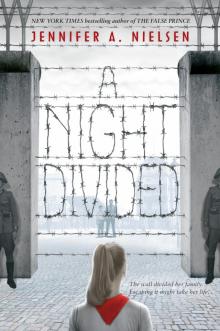 A Night Divided
A Night Divided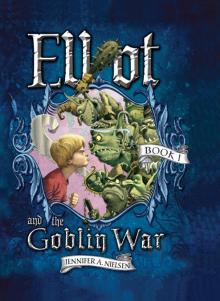 Elliot and the Goblin War
Elliot and the Goblin War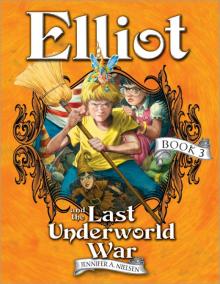 Elliot and the Last Underworld War
Elliot and the Last Underworld War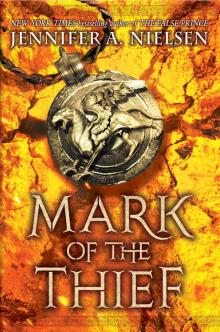 Mark of the Thief
Mark of the Thief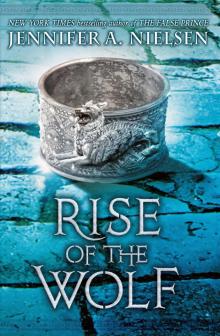 Rise of the Wolf
Rise of the Wolf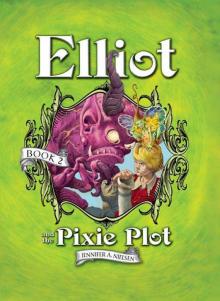 Elliot and the Pixie Plot
Elliot and the Pixie Plot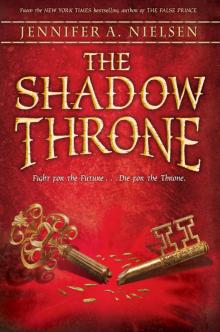 The Shadow Throne
The Shadow Throne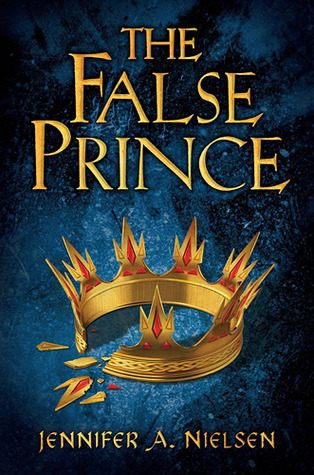 The False Prince
The False Prince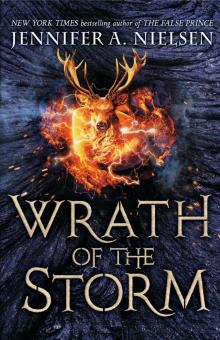 Wrath of the Storm
Wrath of the Storm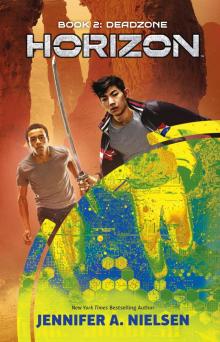 Deadzone
Deadzone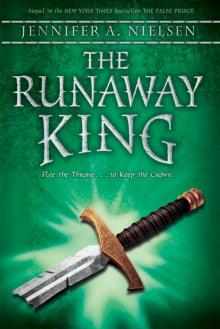 The Runaway King
The Runaway King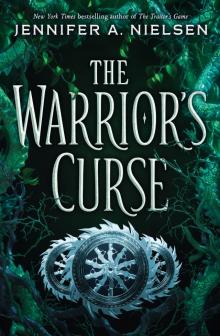 The Warrior's Curse
The Warrior's Curse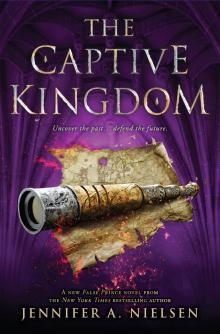 The Captive Kingdom
The Captive Kingdom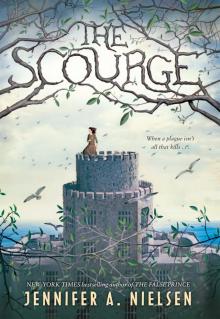 The Scourge
The Scourge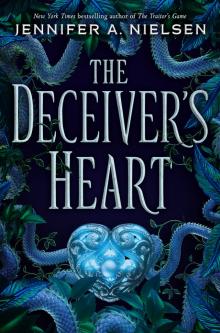 The Deceiver's Heart
The Deceiver's Heart Resistance
Resistance